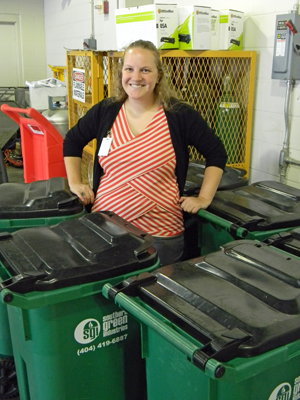My internship with the Federal Reserve Bank of Atlanta has been a great reminder of what I loved so much about working in sustainability. Perhaps it’s just the southern charm that I missed when I lived in New York, but everyone here is so polite, whether it’s greeting each other with a smile and a “good morning” in the hallways, a genuine willingness and enthusiasm at incorporating environmental aspects into our work, or the courteous holding of a door even when the recipient is yards down the hall (I haven’t had to open one door since I started at the Fed and I’m slightly concerned I’ve forgotten how they work). Everyone seems to be on board with the idea of “greening” the Bank. Right before I arrived in early June, Atlanta earned its LEED Existing Building Operations and Maintenance Gold certification, a feat that couldn’t have happened without cooperation from every aspect of the Banks’ functions.
A few weeks ago, my boss asked me to write a post for the 6th District’s (that’s Atlanta and its branch offices in Birmingham, Jacksonville, Miami, Nashville and New Orleans) internal employee blog. He wanted me to write about recycling. I have to admit that my heart sank a little. I think I told my boss that “I have beaten the dead horse” on waste/recycling in my short experience working in the environmental field, but he laughingly told me no one at the Fed had heard what I had to say yet. The public affairs office even asked me to pose with composting bins, much to my horror.

The day my post was uploaded to the blog, I was walking into the cafeteria with some other interns when I glimpsed the news scroll TV in the lobby. There, blown up on a 60” screen, was my compost bin picture and the title of my blog. Even worse was that the blog stayed up for an extra week. By the end of its tenure, several of the women who work in the cafeteria had begun to refer to me as “The Celeb.” Yet the blog earned several comments both online and in person, and it got people talking about the green initiatives in the 6th District. It may have been a little embarrassing for the author, but I think it made even a little bit of a difference.
Below is my blog post written early July:
In my graduate program in environmental policy, it is very easy to get labeled based on your field of interest. There’s the Water Guy who focused all of his independent research on watershed management, drought management, and precipitation rates. Or there’s the Infectious Disease Gal who put her academic efforts into studying the effects of the changing climate on the rates of occurrence of cholera and malaria. Or there’s the student who was really into land conservation and preservation for recreational use and interaction with nature. Our previous experiences vary widely across the spectrum of environmental work, and when I first started school I wanted to capture that diversity of knowledge. Yet, no matter what course of independent study I take, I always seem to end up back at trash.
As much as I tried to avoid becoming the Recycling Expert or the Waste Gal (because honestly, there are more exciting aspects of the environmental field), I’ve come to realize that recycling is still so important to successful sustainability initiatives.
Recycling programs are the first line of participation for the everyday person. The small act of recycling has a big impact, and it is the first step almost everyone takes when getting involved in the environment. At the time of the first Earth Day, the creation of the Environmental Protection Agency and the passing of the Clean Air and Clean Water Acts in the 1970s, recycling became much more prominent in the United States.
Recycling programs were a way for everyone to participate in creating a healthier earth, and it still is. The states in our district have recycling programs in various forms, and participation is key to their success. Georgia sent 12.9 million tons of trash to the landfill, when an estimated 40% of that made of recyclables like plastic, aluminum and paper. While Florida only recycles 29% of its waste currently, the state wants to achieve 75% by 2020.
And so it would make sense that here at the Bank (and at many, many other institutions), our recycling program is one of the most visually present and accessible aspects of our greening. As a newcomer, that’s been especially apparent to me. On my first day as an intern in the environmental department in Atlanta, I didn’t notice that the cafeteria served local food at some of its stations, and I ended up taking the elevator when I got lost trying to find the stairs, but on my wanderings I did see the array of recycling bins in Midtown Grounds, outside the break area of each office, in the conference center—the cans are everywhere.
For so long, Americans seemed to have an “out of sight, out of mind” mentality about trash, but now that recycling is so commonplace, we have to deal with the waste we generate on a daily basis—we have to decide how to sort it, to rinse it or not, or even choose which products to buy based on how much waste their packaging creates. It may be old news, but recycling is still relevant.

Love this post Justine! Who knew you’d become a recycling celeb! -Ari